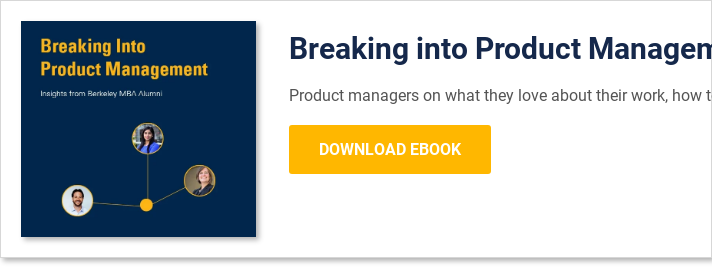The most successful product managers (PMs) rely on a diverse skill set to develop in-demand products that solve real problems. Building product management skills before you assume a PM role will help you acquire the knowledge and experience you need to communicate and negotiate with internal and external stakeholders, work with constrained resources, collect and analyze data, and speak fluently about technical topics.
You can build these five key PM skills inside and outside of the classroom.
Learning to communicate with diverse audiences
Product managers must be able to communicate effectively with customers and with multi-disciplinary and multi-cultural teams
 Vince Law, former head of product management at General Assembly who now consults and instructs individuals as well as organizations on product management and leadership, says a great way to understand and better speak to customers is to study customer development concepts.
Vince Law, former head of product management at General Assembly who now consults and instructs individuals as well as organizations on product management and leadership, says a great way to understand and better speak to customers is to study customer development concepts.
"Understanding techniques such as ethnographic interviews and problem hypothesis definition will improve your ability to get people to speak up about their pain points and to stay objective so you don’t lead customers down a particular path," says Vince.
Max Wesman, a Berkeley MBA alum and VP of Product at GoodHire, says MBA programs offer good ways to build product management skills, including internships. You can also seek out real-world experience, such as a consulting opportunity, on your own to build skills.
"Companies sometimes come to MBA students with part-time work," says Max. "Offering your assistance will help you understand how they organize and how PMs work with engineers."
Outside of an MBA program, Max suggests working independently on developing a website, app, or using the Alexa Skills Kit to teach Alexa a new capability to show you are resourceful, somewhat technical, and can identify customer and market needs.
Wondering if you need an MBA to be a product manager?
Additionally, says Max, PMs often work with developers outside the U.S.in Eastern Europe, India, and China., "Aspiring PMs should try building something on their own and working with an out-of-country developer. Getting experience defining requirements and communicating with people in different cultures will help you simplify your communication and be very careful about your word choice."
Within an MBA program, you can build your communication skills by getting involved in extracurricular activities such as taking on a club leadership role. You can also take courses in leadership communication or leading people.
Building negotiation and conflict management skills
Figuring out how people think and what they want helps PMs resolve conflicts and negotiate trade-offs.
MBA courses that focus on negotiations, conflict resolution, and game theory can help you learn how to negotiate trade-offs with internal and external stakeholders.
"The classes that I took at Berkeley, like Negotiations and Power in Politics, were very helpful in understanding what the other person wants and how to bridge that gap," says Promeet Mansata, Head of Growth and Operations at Zently.
Vince Law suggests practicing a method of problem solving called root cause analysis (also called the 5 Whys).
"Most negotiations start with a need or demand," says Vince. "If you can understand someone's key pain points, it will help you get to the core of the problem rather than addressing the assumed solution. This will enable you to craft negotiation packages and final solutions that are substantially more optimal for both you and your stakeholders."
Jay Dave, who is a senior product manager at Qualtrics, is a proponent of observation and networking.
"Before I got into product management, I sought out opportunities to participate in meetings where I could closely observe experienced product managers and peers communicate and negotiate. I treated every audience with senior leaders as an opportunity to learn."
"There are also circles-informal groups of people-who work in the same function who come together to share tips and discuss best practices," says Jay. "Even if you aren't a product manager, those groups tend to be very open to having people in the audience and can let you observe how people think."
Learning to think like an entrepreneur
PMs often launch new products with limited resources.
 “There really is no substitute for experience”, observes Max. "When I speak with MBA students interested in product management, I tell them to seek out experience in any way they can," says Max. "It doesn't necessarily need to be in a PM role. It could be in a related experience, such as an MBA class project or case competition."
“There really is no substitute for experience”, observes Max. "When I speak with MBA students interested in product management, I tell them to seek out experience in any way they can," says Max. "It doesn't necessarily need to be in a PM role. It could be in a related experience, such as an MBA class project or case competition."
"Build an app; learn how to do a little bit of coding, or work with an outsourced developer," Max says. "There are a lot of tools and services that have made it affordable for someone to try to be a PM on their own."
In an MBA program, taking classes that are designed specifically for entrepreneurs, such as Lean Launchpad and Business Model Innovation & Entrepreneurial Strategy will help you learn how to launch products with limited resources. Networking with seasoned entrepreneurs through extracurricular activities like the Berkeley Entrepreneurs Forum will also help you build your entrepreneurial skills.
Zently’s Promeet Mansata recommends looking for classes and projects that will help you acquire the skills that PMs use on a day-to-day basis.
"In the second year of my MBA, I reached out to several product managers who graduated from Berkeley and asked which classes would be valuable for an aspiring product manager," says Promeet. "They recommended Market Research, Brand Management, Consumer Insights, Pricing, and Entrepreneurship which were all very helpful."
"I also worked on my own project while I was still in school," says Promeet. "I did a lot of experimenting and product work around it. I ultimately decided not to pursue it, but it helped me understand the product role."
Building data analysis skills
PMs collect, apply, and communicate data to prioritize and solve problems.
MBA students considering a career in product management should look for courses that have the words "data" or "analytics" in their titles. This includes courses that fall into that sweet spot between tech and business as well as more complicated tech courses related to computer science and data science. Even a basic statistics class is useful.
"The core Berkeley MBA program mandates everyone to take a basic statistics class," says Swetha Tupelly, a senior product manager at Le Tote and graduate of the Evening & Weekend Berkeley MBA Program. "That lays a good foundation for understanding A/B tests, correlation, causation, and data-based decision making."
"There are also courses that go deeper into certain disciplines," says Swetha. "When I was at Haas, I took Marketing Analytics, which let us go further into how to apply those statistics and run different models to understand customer churn and predict what the customer is going to buy next."
Getting hands-on experience can also help you understand how to use data to make decisions. "If you reach out to small companies who need a hand because they have too much to do and not enough resources, they often take on a student or someone who has a full-time job and wants extracurricular experience," says Max. "If you can offer to do analysis for them, offer to crunch some numbers, or research a market, you can get in and get some experience."
Learning to speak fluently about technical topics
Product managers need to be able to ask the right questions and understand technical constraints and limitations.
If you want to learn how to speak tech, Vince Law suggests learning and practicing key vocabulary.
"If you're expecting to work with designers and engineers, the first step is doing a little bit of reading on design and engineering just to pick up on their language," says Vince. "Step number two is reaching out to a friend, co-worker, or acquaintance from those fields and asking them any questions you have about the reading. This will give you practice speaking the lingo in a safe environment, and in the process, you'll learn more about how designers and engineers think."
 Stephanie Curran, a graduate of the Full-time Berkeley MBA Program and a manager of product management for Amazon’s Customer and Brand Protection Team, took classes that gave her practice communicating with diverse teams.
Stephanie Curran, a graduate of the Full-time Berkeley MBA Program and a manager of product management for Amazon’s Customer and Brand Protection Team, took classes that gave her practice communicating with diverse teams.
"I took New Product Development, a class that integrated engineers with business students." says Stephanie. Stephanie says that you could also consider taking tech-focused courses online or in a classroom to improve your tech vocabulary, but suggests your time may be better spent getting real-world experience.
"If I was still at Haas, I would go back and spend some more time working with projects in a technical space," she says.
Building your PM skill set
PMs need to acquire a diverse set of skills to bring a lasting product to the market. Taking the right classes, gaining experience, and networking with people who work in product management is a good way to start building skills in communication, negotiation, entrepreneurship, data analysis, and tech speak.
Want more information on building PM skills? Download our free ebook on breaking into product management.









